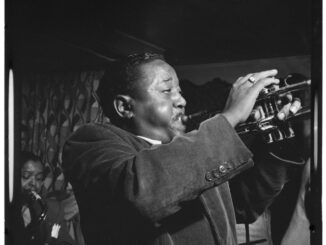

Who: Kamasi Washington and Moonchild
Where: Mr. Smalls Theatre
Date of Review: Nov. 27, 2017
By Joey Mueser | Staff Writer
01/11/2018
Jazz is a completely different art form all together, and it’s beautifully stuck in this constant state of improvement, which redefines exactly what jazz music is. The genre is at a point where it is not at its end; rather, the history of jazz sets aspiring musicians precariously on a springboard, providing them opportunities to thrive in an exciting genre. As technology continues to evolve into an overpowering force, it allows more jazz musicians to express themselves in original ways. Like all great artists, Kamasi Washington’s band put their own spin on jazz. Incorporating some newer sounds with traditional jazz basics, Washington’s group operates like clockwork with a unique voice.
Now, if clockwork is nine people playing their independent parts which are so carefully interwoven into one another, then, yes, they jived like clockwork. Washington’s band is comprised of two saxophone players, a bassist, a guitarist, a groovy man on the keys, a vocalist, a trombonist (who played despite having the flu) and two drummers.
Washington accomplished quite a bit on his own, and over the past decade, he has grown in popularity impressively, and for good reason.
What distinguishes Washington from other sax players — and makes him a reformist — are the new ideas he brings to the table. His melodies are nothing shy of brilliant. His solos are nearly obstreperous in their inability to be tamed. But, song after song on both his albums and live, Washington delivers exciting solos that somehow come back to the theme of the chart. It’s not far-reaching to call Washington a genius.
He knows his tenor saxophone so well that when he plays, it seems to become just a pure extension of his musical thoughts. Whatever he thinks to play can be brought to life instantly — bringing his most genuine interpretation of his music to the table.
The excitement of Washington’s group doesn’t just stop at its headman either. Their whole band is extremely well-versed in jazz backgrounds. Take the man on the keyboard for example, Brandon Coleman. Coleman played with Jamie Foxx, Stevie Wonder and Earth, Wind & Fire, just to name a few. Now, playing with artists who are notably popular doesn’t necessarily make him good. Coleman had to work to get to where he is today, and it shows in the melodies he chooses. I’ve never heard anything like his style, and Washington likes Coleman so much that Washington nicknamed Coleman “Professor Boogie.”
Coleman’s approach to the keyboards was unforgettable, but there is still more to appreciate in respect to the rest of the band. The ill trombonist, despite having a cold sweat, came out for a few songs wearing a scarf and hat, incredibly still playing at an elite level.
Among the performers was also surprise guest Rickey Washington, Kamasi’s father. Rickey, a long time soprano sax musician, previously played with Diana Ross and the Supremes, as well as the Temptations.
The two drummers, Ronald Bruner, Jr. and Tony Austin, played together unimaginably well. The time keeping duo communicated with each other for the whole show and complimented the other’s style seemingly effortlessly. Towards the latter half of the band’s performance, Bruner and Austin shared a solo in which they traded fours, a solo type that allows two (or more) musicians to go back and forth, and having a battle of whose rhythmic ideas are better.
Ideally, I would be able to give full descriptions of everyone who played with Kamasi. However, in order to fulfill those aspirations, I would need a medium sized textbook to fill with the accomplishments and the proper acknowledgements that each of the members of Kamasi Washington’s band deserve.
Despite how wonderful Kamasi’s band is, it still didn’t shadow the technicality and brilliance of Moonchild, the opening act. The jazz/neo-soul group produces groovy lines lead by keys and synthesizers, but is balanced with the smooth vocals of Amber Narvan. Notable from their performance was a jazz trio from the song “Don’t Wake Me,” which is only done in their live renditions of the song. The melodies danced with syncopated lines that can be traced back to early inspirations of big band jazz solis. The trio in the song can be found on YouTube as well as other works from the great and rising group that is Moonchild.
In closing, lead man Kamasi Washington really is driving the train for jazz reformation with his previous music that lies in his wake and everything that is to be aspired in his future works. After all, he’s only 36, and he will be in his prime for a long time to come.




